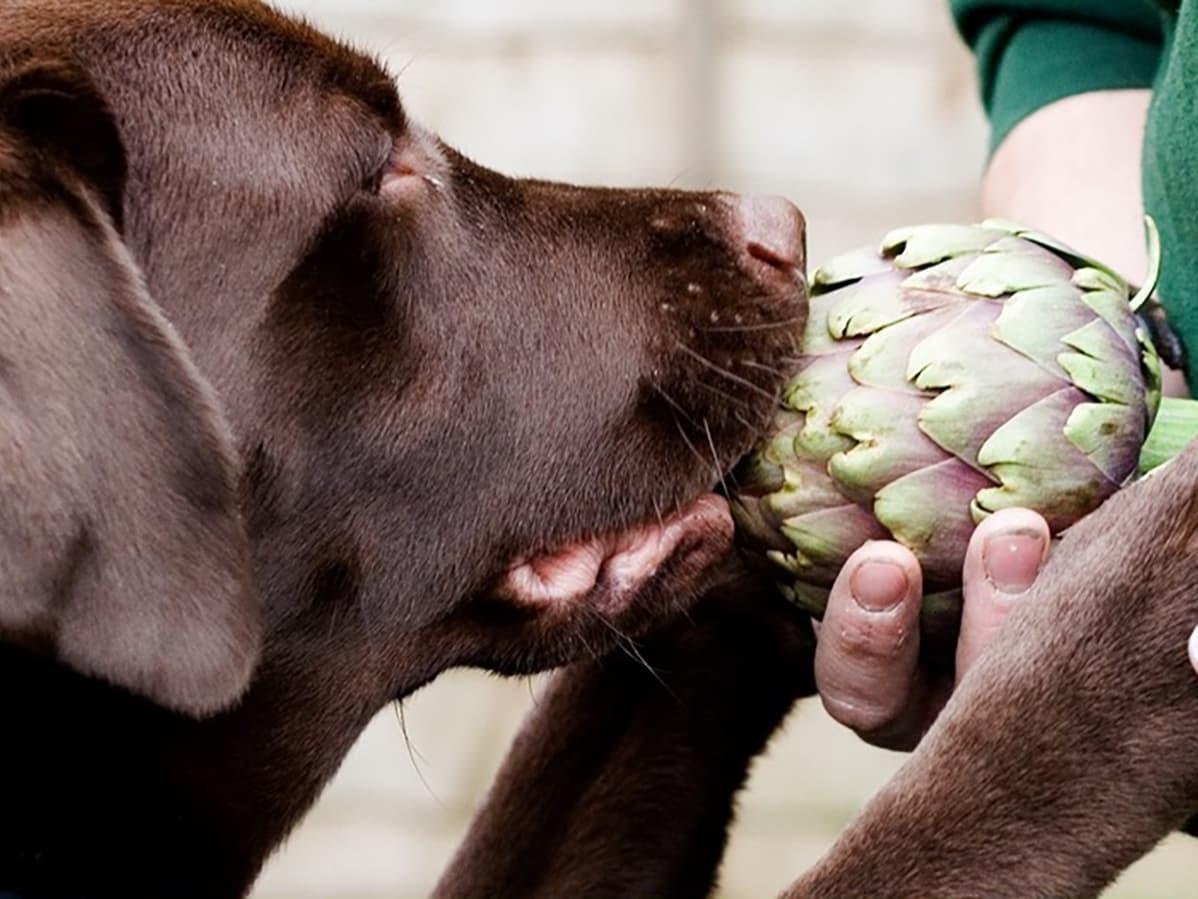Artichokes are one of those foods that many people either love or hate. They make a nice side dish, an excellent ingredient for salads, or a good ingredient for a dip. If you are someone who loves artichokes, you might wonder if your dog can have them.
Can Your Dog Have Artichokes?
If artichokes are a large part of your diet, you’ll be glad to know that your dog can share this food with you. Nutritionally, each part of the artichoke can be added to your dog’s diet. Ensure that you cut the artichokes into bite-sized pieces. Doing this will help you eliminate the chance that your dog will choke on the artichoke.
Remember not to give your dog canned artichokes packed in oil or covered in seasonings. These two things can cause your dog to have an upset stomach or gain too much weight. However, you can give your dog raw, fresh artichokes and cooked artichokes. Steam the entire artichoke and then cut it into bite-sized pieces for your dog.
Are Artichokes Vegetables?
Most people think artichokes are vegetables. While they are edible, they aren’t vegetables like you might think. An artichoke is a part of the thistle family, and the part we eat is actually the bud of the flower before it blooms.
Artichokes and Jerusalem artichokes aren’t the same things, either. A Jerusalem artichoke is an edible part of a member of the sunflower family, which is a totally different plant species.
Can Artichokes Be Bad for Dogs? Artichokes aren’t bad for dogs, provided you cut them into small pieces. If your dog eats a piece of artichoke that is too large, it can choke. Also, before giving your dog artichokes, make sure there aren’t any unsafe seasonings or oils on them. While the food itself is fine for your pet, you can unwittingly hurt your fur baby if you are unaware of how the artichoke was cooked.
Can Dogs Have Other Vegetables?
Asparagus: Asparagus, while technically fine for your dog, isn’t the best choice because raw asparagus is difficult for them to eat, and cooking it so that they can easily eat it eliminates the nutrients.
Bell pepper: Bell pepper is a good source of vitamin C, which helps boost immunity. Avoid offering spicy peppers because they can cause indigestion.
Broccoli: Improve your dog’s heart health by adding broccoli to his diet. Broccoli is rich in vitamins K and C and potassium.
Carrots: Carrots are a safe choice for your dog. They contain biotin, potassium, and vitamins A, K, and B6.
Cauliflower: Cauliflower is a cruciferous vegetable that can cause gas, but you can offer lightly steamed cauliflower to your dog in small amounts.
Lettuce: Cut lettuce into small pieces before offering it to your dog to help avoid choking.
Onions: Onions and other aromatics, like garlic, are a no-no for your dog. They can cause low iron levels and hurt your dog’s kidneys.
Cucumber: Cucumbers are safe for your fur baby, and they offer anti-inflammatory benefits and contain antioxidants.
Pickles: Pickles are okay for your dog, but only give them in moderation because the vinegar, salt, and other pickling spices can be harmful if the dog gets too much.
Celery: Adding celery to your dog’s diet adds vitamins A and C, which can keep the dog acting young and healthy.
Sweet Potatoes: Features a high amount of fiber, which is great for promoting gut health in your pooch.
Other veggies are considered great sources of fiber and vitamins for dogs.
Can Dogs Eat Fruit?
There are many fruits that dogs can eat:
Banana: Bananas are full of potassium, fiber, and biotin, but they also have a high sugar content, so only provide them in moderation.
Blueberry: Blueberries are an excellent treat for your pup. Berries are rich in antioxidants.
Orange: Some dogs don’t like the citrus smell or taste, but oranges are on the okay to eat list.
Melon: Melon is fine for your dog as long as you remove the seeds and the rind.
Pumpkin: Pumpkin is good for your dog’s coat and digestion. Only give pure pumpkin to avoid any possible toxins.
Apple: Dogs, especially older dogs, can benefit from having apples as a snack. They are great sources of fiber, vitamin A, and vitamin C.
Kiwi: Kiwi has potassium and vitamin C, so you can share kiwi with your dog.
Dates: Too many dates can lead to an overweight pooch, but they are okay occasionally.
Cherry: Cherry seeds contain cyanide, so don’t give cherries to your pet.
Cantaloupe: A good source of water and fiber, but it does have a high sugar content, so only offer cantaloupe in moderation.
Papaya: The fruit of the papaya is safe as long as you cut it into bite-sized chunks, but avoid giving your pet the seeds that contain cyanide.
Can Dogs Have Seafood?
Canned tuna: Tuna packed in water is okay for your dog, but avoid giving tuna packed in oil. Tuna is a good occasional snack.
Salmon: Salmon is an excellent source of Omega 3s and proteins.
Seaweed: Avoid letting your dog eat seaweed on the beach, but you can give them unsalted seaweed snacks that don’t have garlic or onion in them.
Shrimp: Shrimp is a high cholesterol food, so it should only be given occasionally.
Crab: Dogs can usually have small amounts of crab, but it can be an allergen, so you need to monitor your dog closely if you give him crab.
Lobster: Lobster is a good occasional treat if it has been prepared simply. You should check with your vet before offering lobster to your dog.
Always ensure that seafood is thoroughly cooked before feeding it to your dog.
Can Dogs Eat Beans?
Beans can be great sources of dietary fibers and proteins which are necessary for a dog’s health.
Green beans: Green beans are low calorie and full of fiber and other nutrients. These are a good choice if you want to feed your pup from the table.
Black beans: Black beans are okay in moderation, but they can cause gas if you give your dog too many.
Lima beans: These are a good source of magnesium, potassium, and folate, but they can cause gas.
Pinto beans: Pinto beans are a good source of nutrients, but they can cause gas, so only give them occasionally.
Garbanzo beans: Give garbanzo beans in a form that is as close to natural as possible. They add fiber and protein to the diet.
Can Dogs Have Dry Fruit or Nuts?
There are many dry fruits that dogs can eat:
Almonds: Dogs can’t digest almonds easily, so it’s best to avoid them.
Cashews: Dogs can usually eat cashews; they are safe and non-toxic.
Pistachios: Pistachios help with brain function and growth by adding vitamin B6 to your dog’s diet.
Raisins: Raisins are unsafe for dogs because they can cause kidney damage.
Expert Insights from Spot
Even small dietary changes can have big impacts on pets’ digestive systems. Spot Pet Insurance data shows that eating inappropriate foods results in average vet costs of $642.* Before sharing snacks or experimenting with new treats, consult your veterinarian to make sure they’re safe for your pet.
The Takeaway
Believe it or not, artichokes aren’t vegetables like we all think, but they are edible for both humans and dogs. If you choose to feed this bud of the thistle plant to your dog, make sure you cut it into bite-sized pieces first. Fido can eat any part of the artichoke raw or cooked as long as it’s unseasoned.
There is a slight chance of allergic reactions to artichokes, but those are usually rare. You can discuss the possibility with your veterinarian and learn the symptoms to watch for. As with any new food, introduce artichokes slowly, and only feed them to your pet in moderation. Remember, your bet needs a well-balanced, nutrient rich diet.

I've had the privilege of immersing myself in the realm of pet safety. As the owner of an energetic mini golden doodle, I know just how stressful being a pet owner can be. I am dedicated to ensuring our beloved pets enjoy a life brimming with good health.
*Jan 2019 to Aug 2024 Spot Pet Insurance Services, LLC claims data.
Vicory-Rosenquest, Tracy. "Can My Dog Eat Artichokes?" The Dog People by Rover, n.d., https://www.rover.com/blog/can-my-dog-eat-artichokes/.
AKC Staff. "Fruits and Vegetables Dogs Can or Can't Eat." American Kennel Club, 15 October. 2025, https://www.akc.org/expert-advice/nutrition/fruits-vegetables-dogs-can-and-cant-eat/.
The information presented in this article is for educational and informational purposes only and does not constitute or substitute for the advice of your veterinarian.












